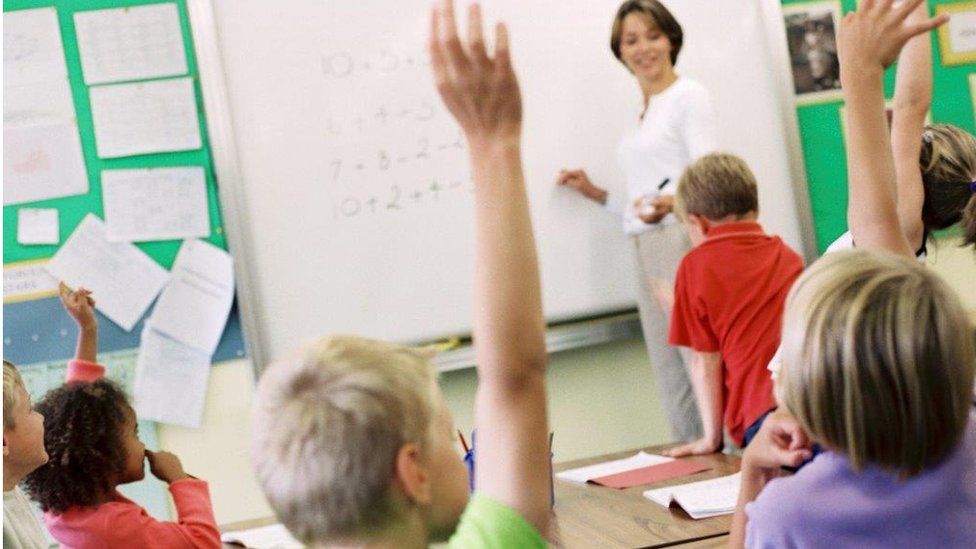Primary pupils' learning gap widens for first time since 2007
- Published
- comments

The learning gap between rich and poor primary age pupils in England has widened for the first time since 2007, analysis of government data suggests.
And figures for both primary and secondary education show progress in helping poorer pupils catch up has stalled overall.
The figures, from 2019, show the shift began even before the pandemic, says the Education Policy Institute.
The government said next month's return to school was a "national priority".
The analysis highlights that policymakers have not adequately responded to warnings that progress in closing the attainment gap was "losing momentum", says the EPI.
'Entrenched reversal'
The researchers identify the increasing proportion of children in persistent poverty as a key cause of the reversal which, they say, is becoming more entrenched each year.
It is widely expected that lockdown school closures will widen the gap even further, says the EPI.
Disadvantaged secondary pupils are more than 18 months behind their better-off classmates by the time they take their GCSEs - the same as five years ago, the researchers found.
The study also highlights several strong indications that the overall gap has started to widen, including:
- disadvantaged primary pupils more than nine months behind, with the gap widening for the first time since 2007
- disadvantaged reception pupils nearly five months behind, the same as in 2013
- last year's report said it would take more than 500 years to close the gap - now it looks as if it is no longer closing at all, says the EPI
The researchers found a strong link between persistent poverty and weaker educational performance.
Children on free school meals for more than 80% of their schooldays were almost two years (22.7 months) behind their wealthier classmates.
Those children on free school meals for less than 20% of their time at school had a learning gap of just under a year (11.3 months).
The learning gap for poor pupils was greatest in:
- Blackpool (26.3 months)
- Knowsley (24.7 months)
- and Plymouth (24.5 months)
And the gaps are lowest in some London boroughs:
- Westminster (0.5 months)
- Redbridge (2.7 months)
- and Ealing (4.6 months)
'Sobering'
"It is deeply concerning that our country entered the pandemic with such a lack of progress in this key area of social policy, and the government urgently needs to put in place new policy measures to help poor children to start to close the gap again," said EPI chairman David Laws.
Sam Butters and Gina Cicerone, joint chief executives of the Fair Education Alliance which collaborated on the report, called its findings "sobering".
"Without systemic change, this gap will never close," they added.
Neil Leitch, chief executive of the Early Years Alliance, said change must start with the youngest children.
"It's time the government recognised this and committed to giving the early years sector the investment it needs," he said.
Kevin Courtney, joint general secretary of the National Education Union, said with children coming to school too hungry to learn, education staff had been working flat out to tackle the effects of poverty, even before the pandemic.
He said the new school term was "the government's chance to right the wrong of society-wide inequality and its impact on educational achievement".
"They must grasp it."
In a statement, the Department for Education did not directly respond to the report's finding that progress on narrowing the learning gap was stalling even before lockdown, but said it was determined to counter educational disruption caused by the pandemic.
"Our £1bn Covid catch-up package will tackle the impact of lost teaching time, including a £650m catch-up premium to help schools support all pupils and the £350m National Tutoring Programme for disadvantaged students.
"This includes up to £9m available for the Nuffield Early Language intervention programme to support those who have missed out on early education at an essential time for their development," said the statement.
- Published30 July 2019